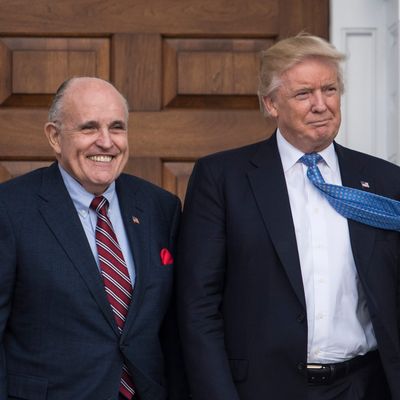
President Trump’s impeachment over extorting Ukraine for domestic political gain has played out in the headlines as a setpiece episode of his presidency, the sequel to the Russia investigation. But when historians look back at the case, they will probably see the affair not as a separate incident but a continuation. Trump formed a political alliance with Vladimir Putin, and exploited it in both his election and reelection campaigns.
For the better part of a decade, a faction of Republicans has been operating in Ukraine in tandem with Russians and their allies, for mutual profit, both financial and political. From Russia’s end, its agenda can be traced through the work of its oligarchs, who are tasked with financing certain kinds of political work on behalf of Putin. Oligarchs like Oleg Deripaska and Dmytro Firtash, who owe their fortunes to Putin’s blessing, have made money off Ukrainian corruption and cultivated friendly politicians there to maintain it.
Paul Manafort is the first major American to join in this effort. Starting in 2004, the Republican campaign strategist turned lobbyist for various global kleptocrats was hired by Russian oligarchs to guide the campaign of the Russophilic Ukrainian president Viktor Yanukovych. Manafort was still indebted to Deripaska when he went to work, gratis, in the same role for Donald Trump.
Trump’s interest in Ukraine began during the 2016 campaign, when Manafort began spreading the alibi that Democratic emails had been stolen by Ukrainians, not Russians. According to this conspiracy theory, the emails were smuggled away on a secret server to Ukraine by CrowdStrike. Whoever originated it, the false theory was promoted both by Russian intelligence and by the American right, because it conveniently absolved both Trump and Putin of any wrongdoing during the campaign.
When he took office, Trump reportedly explained to flummoxed White House officials that he accepted this theory because “Putin told me.” During Trump’s first year, Rudy Giuliani functionally took over for Manafort, who was by this point under FBI investigation. Giuliani immediately recognized the value of Russia’s claim that Ukraine had stolen the emails. “I knew they were hot and heavy on this Russian collusion thing, even though I knew 100 percent that it was false,” he told Glenn Beck. “I said to myself, ‘Hallelujah.’ I’ve got what a defense lawyer always wants: I can go prove someone else committed this crime.”
Trump’s efforts to absolve Russia were not limited to requests that Ukraine locate the imaginary missing server. The New York Times reported in 2018 that Ukraine halted all cooperation with the Mueller investigation at the same time Trump released a previous round of military aid his administration had held up. Ukrainians also allowed Konstantin Kilimnik, Manafort’s partner and an alleged Russian intelligence agent, who had received 75 pages of detailed polling from Manafort during the 2016 campaign, to slip away to Russia, beyond the reach of Robert Mueller.
Over the last year, Giuliani’s network in Ukraine has expanded. The ultimate source of his financing appears to be Firtash, who prosecutors say gave a million dollars to Lev Parnas, one of the hustlers who paid Giuliani. Firtash has been described by most reporters as an oligarch with criminal ties, but his influence is much deeper than that. American reporters who have studied Firtash describe him as a Kremlin proxy agent. The apparent trail of payments from Firtash to Parnas to Giuliani suggests Trump’s diplomacy in Ukraine was outsourced to figures whose loyalty is not to the United States, or even merely the narrow political interests of its president, but a putatively hostile foreign power.
Firtash has brought other figures into his circle: Republican lawyers Victoria Toensing and Joseph diGenova, funneling his propaganda through conservative journalist John Solomon and Representative Devin Nunes. The Russian-Republican partnership in Ukraine has advanced a wide array of benefits to all parties involved. Some of the benefits were financial. They have sought to roll back the Zelensky government’s reforms of its notoriously corrupt energy sector, with the goal of reinserting themselves as profitable middlemen. Control of Ukraine’s energy sector is also a key lever Moscow has used to manipulate its smaller neighbor.
One of Trump’s demands to Volodymyr Zelensky on their July 25 phone call was the reinstatement of Ukraine’s notoriously corrupt prosecutor Viktor Shokin (“I heard you had a prosecutor who was very good and he was shut down and that’s really unfair.”) The partnership undermined reforms in Ukraine, weakening the government and allowing Putin to question its legitimacy. And it generated a stream of pro-Trump, anti-Biden propaganda that has been absorbed into messages for American audiences.
This is not a case of Putin pulling the strings and making Trump dance. It is an alliance of mutual interests, political and financial, that have grown so intertwined it is difficult to tell them apart. Republicans and Russians alike both wish to discredit Ukraine’s reformers and restore its corrupt, Russophilic old regime; to smear the figures who supported those reforms, like Joe Biden, Marie Yovanovitch, and international pro-democracy nongovernment organizations; and to absolve Russia of hacking Democratic emails. There is a plain-English word to describe this arrangement: collusion.






























